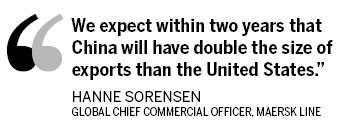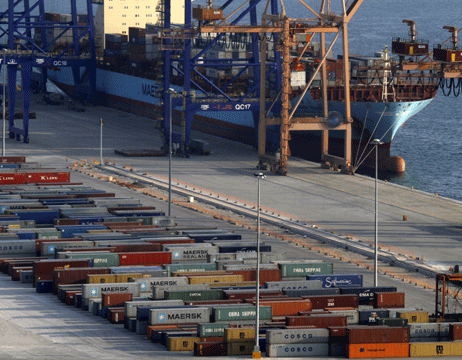Daily freight voyages now being made to Europe
Updated: 2011-12-22 07:42
By Zhou Siyu (China Daily)
|
|||||||||

But over-capacity, surging oil prices may cause losses
QINGDAO, Shandong - China's growing trade volume is expected to continue shoring up the shipping business despite the current market downturn, said Hanne Sorensen, global chief commercial officer (CCO) of Maersk Line, the world's largest container carrier operator by capacity.
Given the rapid expansion in China's export volume during recent years, she said: "We expect within two years that China will have double the size of exports than the United States."
Currently, China's export cargo accounts for more than one third of the company's entire export business across the world, according to the company.
"That is how important China is for us," she added.
This year turned out to be a tough one for the shipping industry. The freight rates, especially on the Asia-Europe route, have been depressed by surging oil prices and over-capacity. Too many vessels were ordered during the optimistic years before the 2008 financial crisis, industry analysts said.
Shipping companies worldwide reported several-million-dollar deficits for the first nine months of this year. Less than 10 percent of big companies across the world managed to make profits, according to industry data.
In a bid to consolidate its leading position on the Asia-Europe line, Maersk Line announced in September plans to run a daily cut-off service called "Daily Maersk". The daily service, started on Oct 24, connects four ports in Asia (Ningbo, Shanghai, Yantian and Tanjung) and three major container ports in Europe (Felixstowe in the United Kingdom, Rotterdam in the Netherlands and Bremerhaven in Germany), according to the company.
"We were running the set-up for nearly four months before the official launch and we have received a good response from the customers," Sorensen said.
The service also promises a fixed transportation time to emphasize its reliability. If the cargo is delayed by fewer than three days, the company will compensate the customer $100 for each container. And if the delay exceeds four days, the compensation fee will rise to $300 for each container, according to the company.
The company aims to deliver 100 percent of its cargo on time with the daily service, compared with an industrial average of 50 percent.
It also hopes to attract customers by helping them save money on warehouses by up to 50 percent, while enabling manufacturers to make better production plans for the market.
"With the Daily Maersk service, we would like to establish a new norm for the whole industry," Sorensen added.
Effects of the movement on the industry remain unclear now, industry analysts said. But it will certainly exert certain pressures on rivals in the industry. In the meantime, some companies still doubt the feasibility of the daily service.
"We would not rush into the same kind of service at the time being," said Zhang Yongjian, secretary of the board of directors at China COSCO Holding Company Ltd, one of China's major shipping companies.
"We still doubt whether there could be enough cargo to support the daily service, especially after China's traditional Spring Festival when business will be weak," he added.
Yet, attracting enough cargo does not seem to be a problem for Maersk. "We have enough cargo already. We are consolidating a number of strings. The Daily Maersk is not an initiative to get more cargo, but to offer a better service to the customers," said Nils S. Andersen, partner and chief executive officer at the AP Moller-Maersk Group.
But under pressure from current low freight rates, the company has had some difficulties in making profits out of the daily service. Freight rates on the Europe-Asia route have recently plummeted to below $600 every container, less than half the peak one year ago.
"Currently, we are offering the service at market-based freight rates. But it will eventually become a premium product after we have proved its value to customers," Sorensen said.
China Daily
|
 Shipping containers owned by AP Moller-Maersk Group and China COSCO Holdings Co Ltd at Piraeus port in Athens, Greece. [Kostas Tsironis/Bloomberg] |











